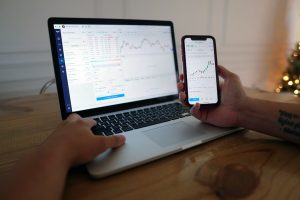Forex trading is a global market that operates 24 hours a day, five days a week. With the advent of technology, traders can access the foreign exchange market from anywhere in the world through online platforms offered by forex brokers. However, technology can also fail, and forex brokers’ websites can go down, leaving traders unable to access their trading accounts. This raises the question, should a forex exchange halt trading when the site is down?
To answer this question, it’s essential to understand how the forex market operates. The forex market is decentralized, meaning that there is no central exchange where all trades take place. Instead, the market is made up of a network of banks, financial institutions, and traders who buy and sell currencies through electronic communication networks (ECNs) and interbank markets. Forex brokers act as intermediaries between traders and the interbank market, providing access to trading platforms and executing trades on behalf of their clients.
When a forex broker’s website goes down, traders lose access to their trading accounts, and they can’t open or close trades. This can be frustrating for traders, particularly if they have open positions that need to be managed. In some cases, traders may be able to contact their brokers by phone or email to place orders manually, but this can be time-consuming and may not be possible during times of high market volatility.
In light of these challenges, some traders argue that forex exchanges should halt trading when their sites are down. They believe that it’s unfair for traders who are unable to access their accounts to be at a disadvantage compared to those who can. Moreover, they argue that it’s in the best interest of the market to ensure a level playing field for all participants to maintain market integrity.
On the other hand, some traders and brokers argue that halting trading when a site is down could do more harm than good. They argue that it’s not practical or feasible to shut down the entire market every time a broker’s website experiences technical difficulties. Moreover, they believe that traders should take responsibility for monitoring their trades and managing their risk, and not rely solely on their brokers to do so.
In reality, there is no one-size-fits-all solution to this issue. The decision to halt trading when a site is down should be left to the discretion of individual forex brokers. Some brokers may choose to halt trading temporarily while they work to resolve technical issues, while others may choose to continue trading and provide alternative means of accessing their trading platforms, such as phone or email.
Regardless of the approach taken, it’s important for forex brokers to have contingency plans in place to ensure that traders can access their accounts and manage their trades during times of technical difficulties. This may include providing alternative means of accessing trading platforms, such as mobile apps or phone trading, or having backup servers in place to ensure that trading can continue even if the primary server goes down.
In conclusion, the decision to halt trading when a forex broker’s site is down is a complex issue that requires careful consideration. While it’s important to ensure a level playing field for all traders, it’s also important to maintain market integrity and ensure that traders can access their accounts and manage their trades during times of technical difficulties. Ultimately, the decision to halt trading should be left to the discretion of individual forex brokers, and they should have contingency plans in place to ensure that traders are not unfairly disadvantaged.






